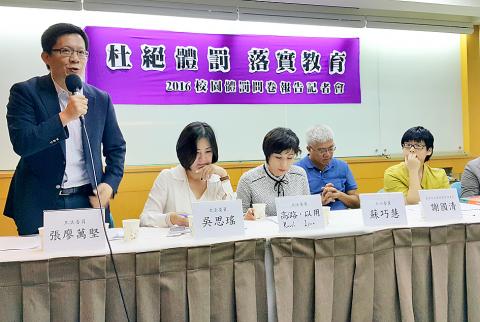The Humanistic Education Foundation yesterday called for the enforcement of zero corporal punishment on campus and urged the Ministry of Education to amend regulations to end all physical and discriminatory punishments of students.
The foundation released the results of a survey, which asked students if they had been subjected to corporal punishment over the past schoolyear.
The poll showed that physical punishment has seen a resurgence, even though it has been banned after the Educational Fundamental Act (教育基本法) was amended in 2006.

Photo: CNA
The survey found that 27.8 percent of elementary-school students and 35.4 percent of junior-high-school students had been subjected to corporal punishment. The figures were up 3.7 percentage points and 4.8 percentage points respectively compared with the last survey the foundation conducted in 2012.
A majority — 56 percent of elementary-school students and 69 percent of junior-high students — said they were punished because of failing grades.
The survey found that 10.5 percent of elementary-school students and 20.6 percent of junior-high students were made to run laps, squat and stand in repetition or perform alternating split squat jumps, duck walk or frog jumps as punishment.
Approximately 8.3 percent of elementary-school students and 8.7 percent of junior-high students said they had been beaten by a school faculty member, while 80.9 percent of elementary-school students and 41.8 percent of junior-high students were denied recess.
Of the students who were denied recess, 1.6 percent, or about 19,000 students, were barred from using the bathroom, while 16.9 percent, or 210,000 students, were allowed to go only at certain times.
Other punishments the foundation said should be abolished included “collateral” punishment, which punishes entire classes because of something one or a few students have done; letters of repentance, which the foundation said are often “forced repentance” based on teachers’ — rather than students’ — thinking, and making students sit in designated “special seats,” which amounts to public humiliation.
Democratic Progressive Party (DPP) Legislator Rosalia Wu (吳思瑤) said that of the 619 teachers who had meted out physical punishments since 2012, only seven had been fired and one suspended; the others had received only minor punishments, such as demerits.
Wu called on the ministry to use guidelines on the disposition of unfit teachers to deal with teachers that give students physical punishments.
She said that she would continue pressuring the ministry to push for legal amendments, thereby eliminating corporal punishment on campus.
The 12-year national education system took effect three years ago, but students’ academic burden has not been alleviated with the implementation of high-school entrance examinations, Taiwan Parents’ Educational Alliance president Hsieh Kuo-ching (謝國清) said, urging the government to launch an examination-free recruitment system soon.
Corporal punishment incites hatred and resentment in students and could give rise to suicidal tendencies, but teachers who have handed out physical punishments do not seem to have given thought to these problems, he said.
Physical punishment is an improper and barbaric style of teaching and the ministry has since banned the practice, Minister of Education Pan Wen-chung (潘文忠) said.
Schools should educate students in a positive manner, Pan said, adding that the ministry would more clearly define the forms of punishments prohibited under regulations governing counseling and education methods in schools.
The number of school counselors have increased in recent years and they will assume an important role in implementing positive education methods, he said.
He called on local education authorities to guide schools in constructing a professional counseling network, thereby streamlining counseling efforts and promoting positive education.

Alain Robert, known as the "French Spider-Man," praised Alex Honnold as exceptionally well-prepared after the US climber completed a free solo ascent of Taipei 101 yesterday. Robert said Honnold's ascent of the 508m-tall skyscraper in just more than one-and-a-half hours without using safety ropes or equipment was a remarkable achievement. "This is my life," he said in an interview conducted in French, adding that he liked the feeling of being "on the edge of danger." The 63-year-old Frenchman climbed Taipei 101 using ropes in December 2004, taking about four hours to reach the top. On a one-to-10 scale of difficulty, Robert said Taipei 101

Nipah virus infection is to be officially listed as a category 5 notifiable infectious disease in Taiwan in March, while clinical treatment guidelines are being formulated, the Centers for Disease Control (CDC) said yesterday. With Nipah infections being reported in other countries and considering its relatively high fatality rate, the centers on Jan. 16 announced that it would be listed as a notifiable infectious disease to bolster the nation’s systematic early warning system and increase public awareness, the CDC said. Bangladesh reported four fatal cases last year in separate districts, with three linked to raw date palm sap consumption, CDC Epidemic Intelligence

Two Taiwanese prosecutors were questioned by Chinese security personnel at their hotel during a trip to China’s Henan Province this month, the Mainland Affairs Council (MAC) said yesterday. The officers had personal information on the prosecutors, including “when they were assigned to their posts, their work locations and job titles,” MAC Deputy Minister and spokesman Liang Wen-chieh (梁文傑) said. On top of asking about their agencies and positions, the officers also questioned the prosecutors about the Cross-Strait Joint Crime-Fighting and Judicial Mutual Assistance Agreement, a pact that serves as the framework for Taiwan-China cooperation on combating crime and providing judicial assistance, Liang

US climber Alex Honnold left Taiwan this morning a day after completing a free-solo ascent of Taipei 101, a feat that drew cheers from onlookers and gained widespread international attention. Honnold yesterday scaled the 101-story skyscraper without a rope or safety harness. The climb — the highest urban free-solo ascent ever attempted — took just more than 90 minutes and was streamed live on Netflix. It was covered by major international news outlets including CNN, the New York Times, the Guardian and the Wall Street Journal. As Honnold prepared to leave Taiwan today, he attracted a crowd when he and his wife, Sanni,